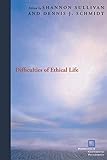Difficulties of Ethical Life / ed. by Shannon Sullivan, Dennis J. Schmidt.
Material type: TextSeries: Perspectives in Continental PhilosophyPublisher: New York, NY : Fordham University Press, [2022]Copyright date: ©2009Description: 1 online resource (256 p.)Content type:
TextSeries: Perspectives in Continental PhilosophyPublisher: New York, NY : Fordham University Press, [2022]Copyright date: ©2009Description: 1 online resource (256 p.)Content type: - 9780823229741
- 9780823291397
- online - DeGruyter
| Item type | Current library | Call number | URL | Status | Notes | Barcode | |
|---|---|---|---|---|---|---|---|
 eBook
eBook
|
Biblioteca "Angelicum" Pont. Univ. S.Tommaso d'Aquino Nuvola online | online - DeGruyter (Browse shelf(Opens below)) | Online access | Not for loan (Accesso limitato) | Accesso per gli utenti autorizzati / Access for authorized users | (dgr)9780823291397 |
Frontmatter -- Contents -- Introduction -- PART I: QUESTIONS OF ETHICS -- 1 In the Name of Goodness -- 2 What Is Philosophical Ethics? -- 3 Hermeneutics as Original Ethics -- PART II: THE ETHICS OF INTERSUBJECTIVITY AND INTERPERSONAL RELATIONS -- 4. Ethical Experience, Ethical Subjectivity -- 5 9/11: America and the Politics of Innocence -- 6 Engage the Enemy: Cavell, Comedies of Remarriage, and the Politics of Friendship -- 7 The Intimacy of Strangers -- PART III: RESPONSIBILITY AND R ACE -- 8 Before Whom and for What? -- 9 Racism and Responsibility -- 10 Whiteness as Family -- PART IV: THE ETHICS OF NONTRUTH -- 11 Narrating Pain -- 12 On Deception -- Notes -- Contributors -- Index
restricted access online access with authorization star
http://purl.org/coar/access_right/c_16ec
This book brings the powerful insights of Continental philosophy to bear on some of the most challenging difficulties of ethical life. Currently philosophy is being radically transformed by questions of how to live well. What does such a way of life mean? How are we to understand the meaning of ethicality? What are the obstacles to ethical living? And should we assume that an ethical life is a "better" life? The movement of history and the developments of culture and knowledge seem to have outstripped the capacity of traditional forms of reflection upon ethical life to understand how we might answer these questions. Ranging from existentialism to deconstruction, phenomenology to psychoanalytic theory, and hermeneutics to post-structuralism, the twelve essays in this volume take up a wide but clearly connected set of issues relevant to living ethically: race, responsibility, religion, terror, torture, technology, deception, and even the very possibility of an ethical life. Some of the questions addressed are specific to our times; others are ancient questions but with quite contemporary twists. In each case, they concern the philosophical significance of ongoing historical, cultural, and political transformations for ethical living and thinking.
Mode of access: Internet via World Wide Web.
In English.
Description based on online resource; title from PDF title page (publisher's Web site, viewed 03. Jan 2023)


